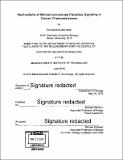Mechanisms of microenvironmental paracrine signaling in cancer chemoresistance
Author(s)
Bent, Eric Huttenlocher
DownloadFull printable version (13.65Mb)
Other Contributors
Massachusetts Institute of Technology. Department of Biology.
Advisor
Michael Hemann.
Terms of use
Metadata
Show full item recordAbstract
Chemoresistance remains a major barrier to the effective treatment of cancer. Cancer therapy occurs in the context of a tissue environment, with cancer cells surrounded by many non-malignant cells that contribute to tumor growth and resistance to therapy. Yet much remains unknown about the tumor microenvironment and its impact on therapeutic response. The specific cell types and microenvironment factors that influence chemoresistance, how therapy induced damage of the microenvironment changes these factors and the mechanisms by which the microenvironment contributes to therapy failure remain incompletely understood. To study microenvironment signaling and its impact on therapy response, I have used mouse models of B-cell leukemia and lymphoma. I find that the chemotherapeutic doxorubicin promotes endothelial IL-6 release through reactive oxygen species-mediated p38 signaling and use tissue specific knockout mice to demonstrate that endothelial-specific production of IL-6 promotes lymphoma chemoresistance in vivo. Doxorubicin induces endothelial-cell senescence, an irreversible growth arrest typically accompanied by a robust secretory response. I show that P13K/AKT/mTOR signaling is repressed in senescent endothelial cells and serves as switch, turning off chronic senescence-associated IL-6 production. These data implicate endothelial paracrine signaling in the promotion of chemoresistance and elucidates the molecular control of acute vs. chronic therapy-induced cytokine secretion. Conventional chemotherapeutics such as doxorubicin can induce anti-cancer immune responses through the promotion of an immunogenic form of cell death. However, these responses are normally repressed by the microenvironment, impairing therapeutic response. I demonstrate that microenvironment IL-6 inhibits the generation of anti-leukemia immunity after immunogenic chemotherapy and find that CD8+ T-cell responses cure the majority of IL-6-/- mice treated with immunogenic chemotherapy. IL-6 also inhibits the efficacy of immune checkpoint blocking agents, implicating it as a promising target to improve the generation of anti-cancer immunity. Thus, the work in this thesis identifies the molecular control of therapy induced endothelial paracrine signaling and identifies a key role for IL-6 in suppressing anti-cancer immune responses induced by therapy.
Description
Thesis: Ph. D., Massachusetts Institute of Technology, Department of Biology, 2016. Cataloged from PDF version of thesis. Includes bibliographical references.
Date issued
2016Department
Massachusetts Institute of Technology. Department of BiologyPublisher
Massachusetts Institute of Technology
Keywords
Biology.